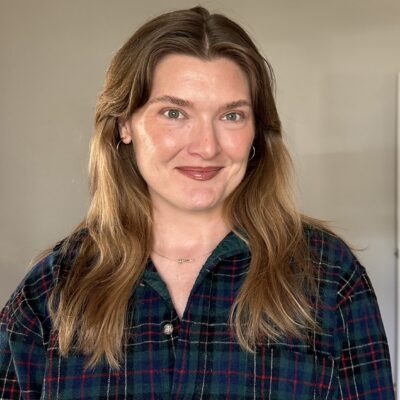Michelle Juergen is an Albuquerque-based copywriter, writer, and editor with experience in magazine publishing, copywriting, copyediting, content marketing, and journalism. She has an unending desire to learn anything and everything about the world, seek out unique experiences and meaningful connections, and tell stories that resonate.
We spoke with Michelle on her background, her pivot to full-time freelance work, and valuable writing and editing advice she’s picked up on her career journey.
Talk a bit about yourself and your background
I’ve always been very curious. As a kid, I asked a million questions (too many, my teachers and parents might have said). This curiosity led me to writing, and eventually to journalism, which seemed perfect because it’s a career where you get paid to ask questions. In college, I majored in journalism, but after taking an editing class I realized I preferred the writing and editing side of the job over reporting. That’s how my brain works: I’ve always been obsessed with language.
Graduating during the recession was tough—I had three jobs and lived with my parents. One of those jobs was an internship at Entrepreneur Magazine, where I worked hard to prove myself and eventually secured a full-time position. From there I transitioned to TravelAge West, a travel trade magazine, where I stayed for six years until the pandemic hit. I was laid off in March 2020 and pivoted to freelance creative services, focusing on copywriting and copy editing.
How have you worked with John and Jmac?
I was recommended to John by Jennifer Wang from 2X, a client of Jmac’s. I conduct interviews and ghostwrite bylines for various 2X executives, which are then pitched for publication. I also wrote award submissions for 2X and their CEO, Domenic Colasante. This led to several award wins, including Ernst and Young’s Entrepreneur of the Year 2024 for Greater Philadelphia, Martech’s Breakthrough Award for Best Content Writing Service, and the Remote Tech CEO of the Year Award for Domenic. These successes were exciting because they demonstrated the impact of our collaboration.
What’s a success story or career accomplishment you’re particularly proud of?
Pivoting to freelance after being laid off at the start of the pandemic was a big accomplishment. Although it was a stressful time, it forced me to pursue something I had been considering for years. Freelancing allowed me to use my skills and connections and turn a challenging situation into a rewarding career. Through social media and networking, I secured various projects, including a part-time copywriting position and an article for Business Insider. These opportunities snowballed, leading to long-term clients and a freelance career.
Freelancing has not only enhanced my career, but also provided better work-life balance, allowing me to pursue personal interests and hobbies. Moving to New Mexico and lowering my cost of living has contributed to a more relaxed and fulfilling lifestyle.
This transition has been one of my proudest achievements, because freelancing full time can be very volatile and unpredictable. But it comes down to learning to trust the process, your connections, and yourself.
What’s one valuable insight you’ve gained as a writer and editor?
I’ve learned there’s no right way to be a writer or editor. Rules help us communicate effectively, but language is also so wild and expansive. Initially, my focus on perfection hindered my creativity. Over time, I’ve embraced the idea of “write first, edit later.” Allowing myself to write freely before editing has been key to fostering creativity and producing meaningful work. This is something I’m constantly reteaching myself to balance my editorial instincts with creative expression.
What advice do you have for content writers and editors looking to improve their skills?
For one, read widely, both for enjoyment and research. Dissect what you read to understand why it’s impactful and how it could be improved. Engage in discussions about content with others to gain different perspectives.
Also, take courses and quizzes to refresh your skills. Understanding and justifying the rules of writing and editing is crucial, even if you choose to break them.
Finally, reading your work aloud is a good way to hear what sounds good and what sounds clunky. This has improved my ability to write good copy, especially when it’s something pithy like a headline or a subhead.
For more insights or to connect with industry experts, contact the Jmac PR team today.
